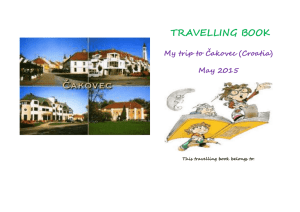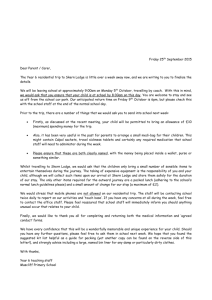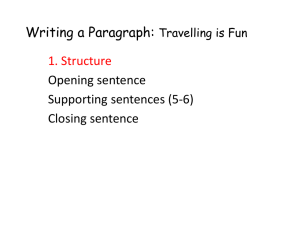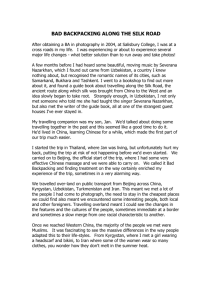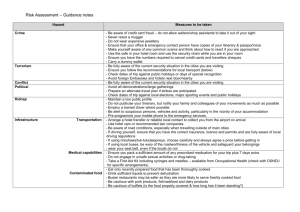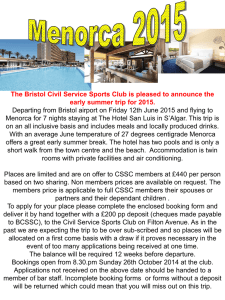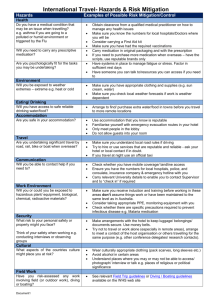Tips for travelling
advertisement
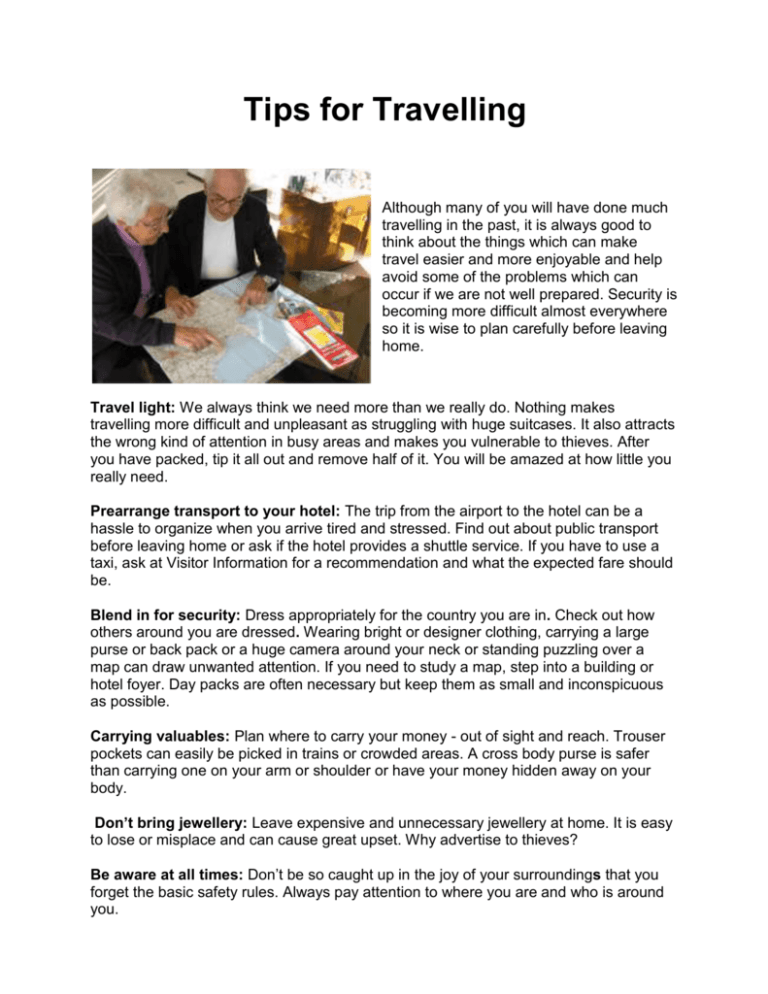
Tips for Travelling Although many of you will have done much travelling in the past, it is always good to think about the things which can make travel easier and more enjoyable and help avoid some of the problems which can occur if we are not well prepared. Security is becoming more difficult almost everywhere so it is wise to plan carefully before leaving home. Travel light: We always think we need more than we really do. Nothing makes travelling more difficult and unpleasant as struggling with huge suitcases. It also attracts the wrong kind of attention in busy areas and makes you vulnerable to thieves. After you have packed, tip it all out and remove half of it. You will be amazed at how little you really need. Prearrange transport to your hotel: The trip from the airport to the hotel can be a hassle to organize when you arrive tired and stressed. Find out about public transport before leaving home or ask if the hotel provides a shuttle service. If you have to use a taxi, ask at Visitor Information for a recommendation and what the expected fare should be. Blend in for security: Dress appropriately for the country you are in. Check out how others around you are dressed. Wearing bright or designer clothing, carrying a large purse or back pack or a huge camera around your neck or standing puzzling over a map can draw unwanted attention. If you need to study a map, step into a building or hotel foyer. Day packs are often necessary but keep them as small and inconspicuous as possible. Carrying valuables: Plan where to carry your money - out of sight and reach. Trouser pockets can easily be picked in trains or crowded areas. A cross body purse is safer than carrying one on your arm or shoulder or have your money hidden away on your body. Don’t bring jewellery: Leave expensive and unnecessary jewellery at home. It is easy to lose or misplace and can cause great upset. Why advertise to thieves? Be aware at all times: Don’t be so caught up in the joy of your surroundings that you forget the basic safety rules. Always pay attention to where you are and who is around you. Contact the local tourist office: They are the best source of information for tips and tourist information on all aspects of your trip – accommodation, transport and all sightseeing as well as security. Use a travel agent: Whilst the internet has simplified travelling it has also made it more complex. A travel agent can help with all aspects of travel and if a problem arises, you have someone to call. Plan ahead and get some rest: Just getting away can be the hardest part of any trip, with deadlines to meet and family arrangement to make. If you have not slept well before you leave, tiredness leaves you foggy and likely to make mistakes with connections and other arrangements. Fatigue also makes us vulnerable to illness and human predators. Start packing early and avoid a last minute panic. Comfort and wellbeing on long flights: If you are concerned about the effects of sitting for long periods, if you fear blood clots (DVT) or suffer with ankle swelling or arthritic aches and pains, then never leave home without an Aircycle inflatable exerciser. It pops in your pocket or purse and is easy to use throughout your flight or train journey for comfort. If you use it frequently, it helps to maintain normal blood circulation while you sit. If you like to remove your shoes during the flight but have difficulty putting them back on to disembark, ankle swelling can be largely prevented by using the Aircycle consistently while you are awake. The Aircycle can also be used as a back or head rest or placed under your knees or thighs while you sleep. This prevents the blood supply from being cut off by the edge of the seat which can happen, especially if you have short legs. This is important as we now know that it is during sleep that blood clots more frequently occur. So prepare well and set out confident that you will enjoy every moment of your trip. More information on http://www.aircycle.co.nz/plane-travelling-exercise.html Acknowledgement: Some information taken from the Wisanow newsletter 1st May 2013.
